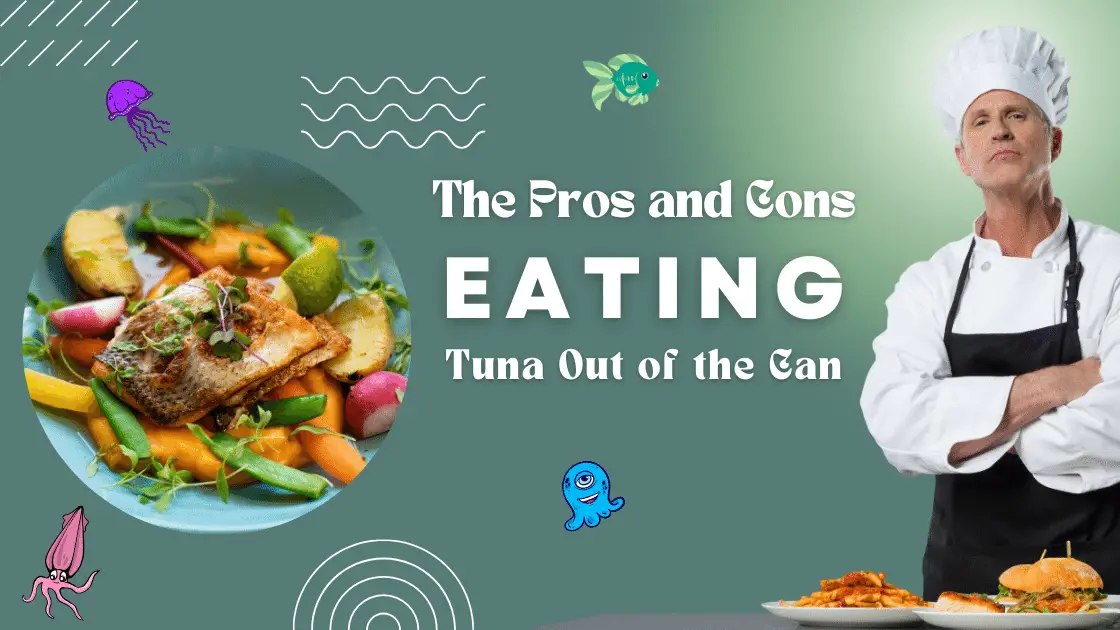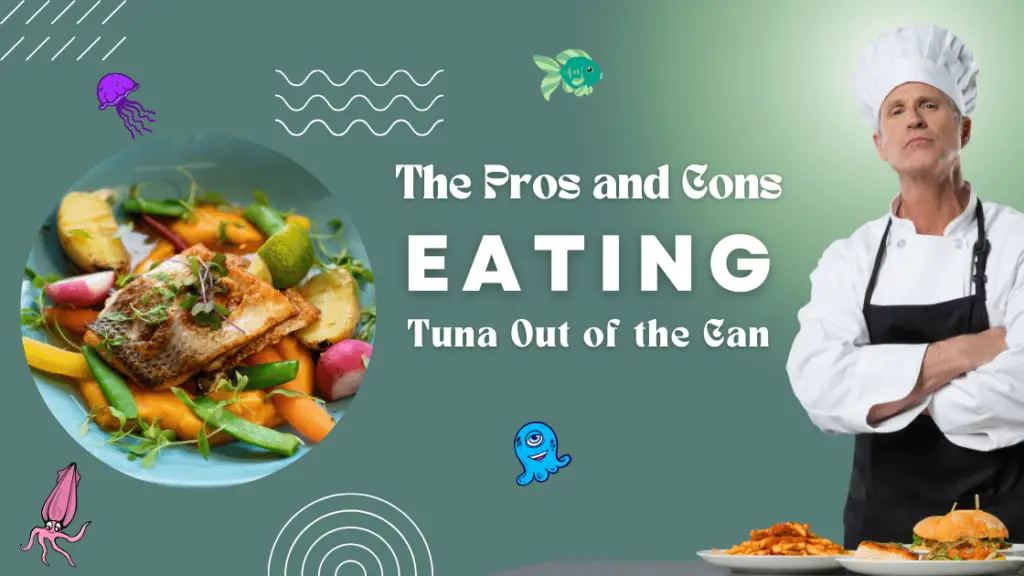The Pros and Cons of Eating Tuna Out of the Can

For many individuals, eating tuna straight from the can is a handy and well-liked choice. On the one hand, it offers a convenient and rapid source of protein that may be consumed on alone or combined with other foods. Furthermore, canned tuna is often inexpensive and has an extended shelf life, making it a cost-effective option.
But it’s important to take into account any possible downsides. For example, some people may prefer the texture and flavor of fresh tuna to that of canned tuna. In addition, excessive mercury consumption poses health risks; this metal is present in several varieties of tuna. Ultimately, there are benefits to eating tuna straight from the can, but it’s vital to consider any possible drawbacks as well.

10 Reasons Why Eating Tuna Out of the Can is Convenient
When it comes to fast and simple dinners, canned tuna—which is sometimes disregarded in the culinary world—emerges as the ultimate convenience champion. Because of its nutritious value and adaptability, tuna in a can has become a mainstay in many homes. This post will discuss 10 reasons why choosing canned tuna for busy people and families is not only a tasty and nutritional option, but also a time-saver.
1. Instant Gratification
A protein-rich dinner is available right away with canned tuna. Not requiring any cooking or preparation, it’s the ideal answer for those instances when hunger comes without warning. Simply crack open the can, and you’ll have a filling supper in a matter of minutes.
2. Long Shelf Life
The longer shelf life of tuna in a can is one of its main advantages. Having canned tuna on hand gives you a steady supply of protein that doesn’t go bad easily, making it a great pantry essential for last-minute dinners or unexpected circumstances.
3. Portability and On-the-Go Snacking
For those who lead hectic, mobile lives, tuna in a can is a convenient and lightweight solution. Tossing a can of tuna into your bag before you go for work, school, or a picnic guarantees a fast and wholesome snack or dinner wherever you are.
4. Minimal Preparation
Do away with the lengthy meal prep periods. No more complicated recipes or laborious cooking when you use canned tuna. To access this multipurpose food that may be used in salads and sandwiches, all you need is a can opener.
5. Versatility in Culinary Creations
Tuna in a can is a flexible medium for creative cooking. You may try out numerous dishes with it because of its neutral taste, which goes well with a variety of components. There are several options available, ranging from tuna salads and wraps to casseroles and pasta meals.
6. Nutrient-Rich and Health Benefits
Tuna in a can is a nutritional powerhouse that goes beyond ease of usage. It adds to a well-rounded and healthful diet since it is full of critical vitamins and minerals, high-quality protein, and omega-3 fatty acids. Including canned tuna in your diet promotes heart health, cognitive health, and general well-being.
7. Cost-Effective Option
Cantaloupe is a more affordable option when compared to fresh fish. It offers a cost-effective approach to add high-quality protein to your diet without going over budget. This makes it a great option for families and people on a tight budget.
8. Environmental Sustainability
Selecting tuna in cans as opposed to fresh is environmentally sustainable. Responsible fishing methods are given first priority by a number of canned tuna companies, so you may enjoy your dinner without endangering the wellbeing of our oceans and marine ecosystems.
9. Reduced Food Waste
Because canned tuna doesn’t decay as rapidly as fresh fish, it helps reduce food waste. Because tuna has a long shelf life, you may buy it and utilize it as required, which lowers the possibility that products in your kitchen will go bad.
10. Easy to Store and Stack
The small size of canned tuna makes it simple to stack and store in your cupboard. It is an easy item to organize because of its consistent shape and standardized packaging, which makes it easy for you to keep track of your pantry inventory.
Conclusion
Convenience is a major element when choosing what to eat in the hectic pace of contemporary life. In this context, canned tuna shines because it provides several advantages beyond time-saving. It’s a very appealing choice for people and families looking for a fast, simple, and delectable dinner solution because of its adaptability, nutritional profile, and sustainability. Thus, the next time you’re looking for a quick and filling dinner, grab that can of tuna and discover a whole new universe of culinary options without compromising on taste or health.
Must Read: How Soup Lover’s Delight Wendy’s Has Soup on Their Menu
FAQ (Frequently Asked Questions)
What are the nutritional benefits of consuming canned tuna?
Omega-3 fatty acids, vitamin D, selenium, and lean protein are all included in canned tuna, which is beneficial for heart and general health.
Are there any health concerns associated with consuming canned tuna?
Although mercury levels in tuna are normally low, there are worries over bigger species' mercury concentration. Reducing intake is advised to prevent health problems associated to mercury, particularly for youngsters and pregnant women.
What are the potential disadvantages of consuming canned tuna?
The possibility of mercury exposure, additional salt or preservatives in certain kinds, and possible overfishing-related fish resource depletion are other drawbacks.
Can eating canned tuna daily have negative health effects?
Indeed, eating canned tuna regularly may cause the body to accumulate mercury, which may negatively impact brain development, particularly in developing infants and fetuses.
What are the different types of canned tuna available, and do they have distinct pros and cons?
There are many varieties of canned tuna, such light tuna, which has less mercury, and white tuna, which has more mercury. Because light tuna has less mercury, it is usually favored for frequent intake.
How can one mitigate the health risks associated with canned tuna consumption?
Choose light tuna, brands that test for mercury levels, and a variety of fish and shellfish to balance your diet are good ways to decrease your exposure to mercury.
Is it safe to consume canned tuna during pregnancy?
Due to possible mercury exposure, pregnant women are recommended to reduce their consumption of canned tuna. For individualized guidance, speaking with a healthcare professional is advised.
What are the environmental impacts of tuna fishing and canning?
Tuna fishing raises significant environmental issues due to overfishing and bycatch. Selecting tuna from environmentally friendly sources and using sustainable fishing methods will help lessen these effects.
Can canned tuna be part of a balanced and healthy diet?
Yes, when eaten in moderation, canned tuna may be a component of a balanced diet. Although it offers vital nutrients, it should be eaten in combination with other meals to provide a balanced diet.






One Comment